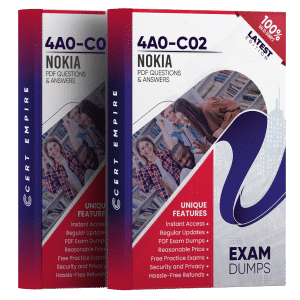Nokia 4A0-C02 Exam Questions 2025
Ace the Nokia 4A0-C02 Mobile Gateways exam with expertly reviewed Exam Questions from Cert Empire. Every item is current, accurate, and supported by our online simulator for a seamless and confident certification experience.
What Users Are Saying:
About 4A0-C02 Exam
Overview of Nokia 4A0-C02 and Its Role in Professional Networking
The Nokia 4A0-C02 SRA Composite exam stands as a critical checkpoint for those already working within IP network infrastructure and service routing environments. This certification belongs to the Service Routing Architect (SRA) path, which Nokia positions as a deep, command-line-level credential. It’s not meant for entry-level technicians or casual learners. Instead, this exam targets professionals with experience in network design and core routing.
Candidates pursuing this exam typically work with Nokia’s SR OS, using 7750 routers or managing Layer 2 and Layer 3 services in telecom setups. The exam combines the core subjects from multiple certifications in the SRA track and challenges engineers to prove they can perform under realistic, time-constrained conditions. With real-world skills being a central focus, it remains one of the most valued Nokia exams among ISPs and service integrators in 2025.
What Makes SRA Certification Different from Broader IT Certifications
Nokia’s SRA pathway doesn’t compete with broad IT certifications that cover networking lightly. It cuts deep into routing policy, MPLS architecture, and service delivery models. While other certifications touch on BGP or OSPF at a theoretical level, the SRA Composite exam wants to know if you can implement routing changes in production.
This is what separates it:
- Config-level questions instead of theory recaps
- Built-in assumption of prior knowledge
- Protocol interactions across domains tested together
- Exclusive focus on service provider-grade equipment
In short, this exam is structured for people who already live inside routing tables and want a credential that actually reflects their day-to-day work.
Who Should Really Be Taking the 4A0-C02
Most people who take the Nokia 4A0-C02 Composite exam aren’t new to the industry. They usually have background in routing protocols or have cleared other Nokia SRC exams. It’s common for engineers in large service provider networks to sit for this test once they start working on cross-domain designs or core infrastructure.
It’s best suited for:
- Network support engineers dealing with PE-CE links
- IP/MPLS consultants handling customer networks
- Solution architects working on carrier-grade deployment models
- Engineers aiming to move from operations to planning roles
Nokia recommends having passed earlier certifications like NRS II or having practical exposure to their router CLI environment. It’s not a requirement, but skipping that experience usually shows in the results.
Why These Skills Are In Demand on Real Teams
Employers are increasingly hiring based on actual troubleshooting skills, not theoretical models. SRA-certified professionals are often brought in to manage advanced policy rules, adjust QoS on live flows, or deploy LDP/RSVP tunnels without disrupting existing services.
Some of the core skills candidates walk away with include:
- Modifying and optimizing BGP prefix filters
- Deploying Layer 2 and Layer 3 VPNs on Nokia hardware
- Designing service routing policies with route targets and route distinguishers
- Working directly with QoS classifiers and schedulers
- Maintaining traffic engineering across MPLS cores
These skills are measurable in day-to-day operations, which is why many teams request them directly in job descriptions.
The Value of Nokia’s Certification in the 2025 Job Market
Nokia’s relevance in core routing continues into 2025, especially across telecom operators, ISP backbones, and government infrastructure networks. Their SRA Composite badge still appears on job listings from Tier 1 and Tier 2 service providers. While some environments lean toward Cisco or Juniper, Nokia keeps its niche by sticking to carrier-grade focus with detailed exam benchmarks.
Some current factors that keep this exam relevant:
- Multi-vendor networks still rely heavily on Nokia 7750 gear
- Nokia’s operating system features unique IP/MPLS implementations
- The Composite exam is syllabus-aligned with real operational tasks
This focus is why the SRA badge doesn’t fade year over year. Engineers with this credential continue to see career boosts, particularly in regions like the EU, Middle East, and Asia-Pacific where Nokia hardware is widely used.
Who Hires People with Nokia SRA Certification
The cert opens doors in several key industries and roles. While it isn’t designed for casual IT support jobs, it fits cleanly into specialist, engineering, and design-focused positions.
|
Role Title |
Expected Annual Salary (USD) |
|
Network Routing Engineer |
$90,000 – $100,000 |
|
IP/MPLS Design Consultant |
$105,000 – $120,000 |
|
Carrier Network Infrastructure Planner |
$110,000 – $125,000 |
|
Senior Technical Support (Routing) |
$80,000 – $95,000 |
|
Telecom Core Services Architect |
$120,000 – $140,000 |
Large ISPs, government telcos, and even energy providers managing smart grids look for SRA-certified engineers when building or upgrading routing cores.
How Much Preparation This Exam Usually Demands
This is not a test you take casually. Candidates coming into the 4A0-C02 with limited prep tend to struggle. A more common approach is to study for 6–8 weeks, typically alongside a full-time job, dedicating 1–2 hours per day. Those with heavier Nokia CLI background may go faster, but protocol simulation and command-line review is still necessary.
Prep involves:
- Revisiting foundational material (BGP, MPLS, QoS)
- Practicing config scenarios based on service types
- Understanding traffic flow between routing layers
- Watching how tunnels and service paths interact under policy constraints
The time commitment is real, but the outcome makes a difference for those aiming to specialize.
2 reviews for Nokia 4A0-C02 Exam Questions 2025
Discussions
There are no discussions yet.


Oliver Knox (verified owner) –
I passed the 4A0-C02 exam thanks to the study materials and practice tests. They gave me a clear view of the exam structure, and I felt prepared when the time came.
Kusumlata Sharma (verified owner) –
The practice materials followed the latest syllabus closely. Cert Empire ensures all updates are reflected promptly, which gives confidence when preparing for new exam versions.